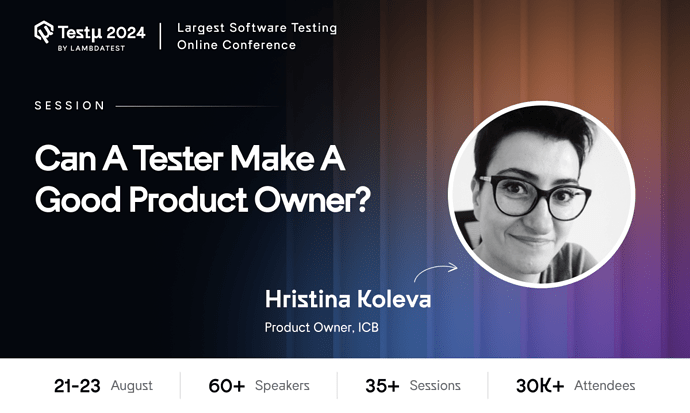Hristina Koleva discusses her transition from QA to Product Owner. 
She’ll share how testing skills translate to product ownership and the contrasts between assumptions in testing and product management.
Not registered yet? Don’t miss out—secure your free tickets now and register now.
Already registered? Share your questions in the thread below 
Hi there,
If you couldn’t catch the session live, don’t worry! You can watch the recording here:
Here are some of the Q&As from this session:
Is it possible that the perceived ‘bad’ Product Owners you worked with resulted from systemic issues within the organization, such as lack of training or unrealistic expectations? How much responsibility lies with the individual versus the system?
Hristina Koleva: Yes, systemic issues like lack of training or unrealistic expectations can contribute to perceived poor performance. Responsibility is shared between the individual and the system; both need to address and resolve underlying issues.
How do you reconcile the inherent tension between a Product Owner’s need to deliver features quickly and a QA’s focus on thorough testing, especially when tight deadlines are involved?
Hristina Koleva: Prioritize risk-based testing to focus on critical areas, implement effective test automation to speed up the process, and maintain open communication to balance speed with quality.
Product owner play bridge between solutions team and Development team. Do you think this role is really required if solution manager can directly speak with team? This role is being generated in Agile world and earlier we are having business analyst.
Hristina Koleva: The Product Owner role is crucial in Agile for prioritizing the backlog and ensuring alignment with business goals. While solution managers and business analysts have their roles, the Product Owner ensures a continuous focus on product value and user needs.
Here are some unanswered questions that were asked in the session:
What are the key skills and traits that a tester brings to the role of a product owner?
What kind of assumption do testing team make?
What Assumptions can we correct in ourselves to better improve ourselves as testers communicating with product owners? 
What assumptions do testers commonly make when transitioning to a Product Owner role?
What is more important for testing?
What unique strengths do testers bring to the role of Product Owner?
Can a manager be a good tester for his organization?
What skills should we need to acquire to transition to a PO?
What skills and experiences from your testing background do you believe are most transferable to the role of a product owner?
What’s the career and upskilling path that might bring a tester to a product ownership role?
What should a Product Owner do to be a domain expert?
What is the strategy to improve a tester to a good product owner?
What key skills or experiences from a testing background are most valuable when transitioning to a Product Owner role?
Do you believe that the traditional emphasis on exhaustive acceptance criteria in user stories could actually stifle creativity or slow down the development process?
How would you handle conflicting priorities between technical debt (identified by testers) and new feature development as a product owner?
![]()
![]()

